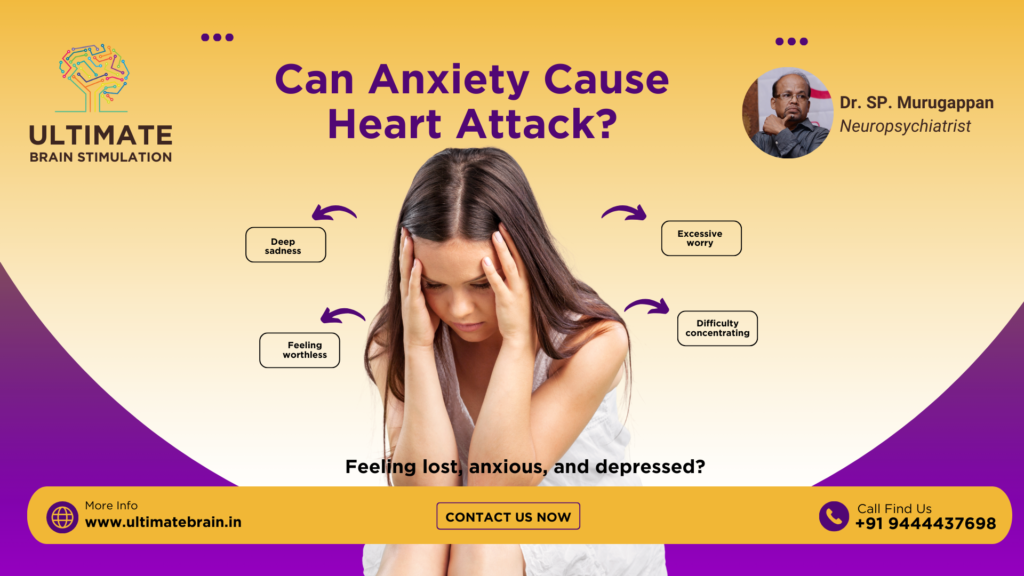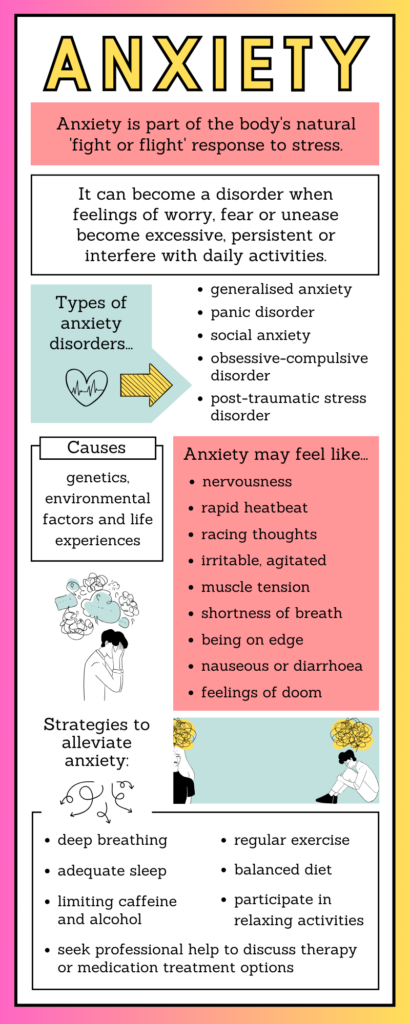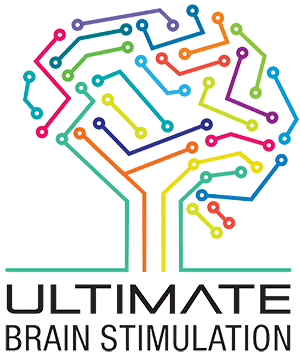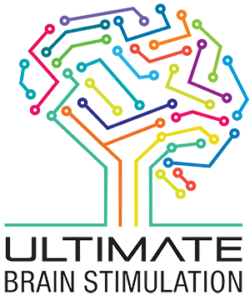Introduction
We often hear about the detrimental effects of stress and anxiety on our health, but how serious can it get? Specifically, can anxiety lead to something as severe as a heart attack? At the Ultimate Brain Stimulation Clinic in Chennai, we strive to educate our patients about the profound impact of mental health on physical well-being. Let’s delve into the intricate relationship between anxiety and heart health.

Understanding Anxiety
What is Anxiety?
Anxiety is a natural response to stress. It’s a feeling of fear or apprehension about what’s to come. While a little anxiety is normal and sometimes beneficial, chronic anxiety can be debilitating.
Common Symptoms of Anxiety
Anxiety manifests in various ways, including:
- Persistent worrying
- Restlessness
- Fatigue
- Difficulty concentrating
- Muscle tension
- Sleep disturbances
Types of Anxiety Disorders
There are several types of anxiety disorders, each with unique characteristics:
- Generalized Anxiety Disorder (GAD)
- Panic Disorder
- Social Anxiety Disorder
- Specific Phobias
- Obsessive-Compulsive Disorder (OCD)
- Post-Traumatic Stress Disorder (PTSD)
How Anxiety Affects the Body
Physical Manifestations of Anxiety
When you’re anxious, your body goes into fight-or-flight mode. This response involves a surge of adrenaline, increased heart rate, and rapid breathing. Over time, chronic anxiety can lead to:
- Elevated blood pressure
- Heart palpitations
- Increased risk of coronary artery disease
Long-Term Effects of Chronic Anxiety
Prolonged anxiety can wear down your body, contributing to chronic conditions such as:
- Gastrointestinal issues
- Respiratory disorders
- Weakened immune system
- Heart disease
The Heart-Anxiety Connection
Can Anxiety Cause Heart Attacks?
Yes, anxiety can potentially trigger heart attacks, especially in individuals with preexisting heart conditions. The intense physical stress and adrenaline rush during anxiety attacks can strain the heart, sometimes leading to a heart attack.
Mechanisms Behind Anxiety-Induced Heart Issues
Anxiety affects the heart through several mechanisms:
- Increased Heart Rate: Anxiety causes your heart to beat faster, which can be dangerous over time.
- Blood Pressure Spikes: Anxiety leads to temporary spikes in blood pressure, which can damage arteries.
- Inflammation: Chronic anxiety can increase inflammation, a known risk factor for heart disease.
Risk Factors
Who is at Higher Risk?
Certain individuals are more susceptible to anxiety-induced heart problems, including:
- Those with preexisting heart conditions
- Individuals with a family history of heart disease
- People with high-stress lifestyles
Role of Genetics and Lifestyle
Genetics play a role in both anxiety and heart disease. Additionally, lifestyle factors such as poor diet, lack of exercise, and smoking can exacerbate both conditions.
Signs of Anxiety-Induced Heart Problems
Recognizing the Warning Signs
It’s crucial to recognize the symptoms of heart problems triggered by anxiety:
- Chest pain
- Shortness of breath
- Dizziness
- Rapid or irregular heartbeat
When to Seek Medical Help
If you experience any of the above symptoms, especially if you have a history of heart issues, seek medical attention immediately.
Diagnostic Approaches
How Doctors Diagnose Anxiety-Related Heart Issues
Doctors use a combination of medical history, physical exams, and diagnostic tests to determine if heart problems are related to anxiety.
Tests and Evaluations
Common tests include:
- Electrocardiogram (ECG)
- Stress tests
- Blood tests
- Echocardiograms
Treatment Options
Medical Treatments for Anxiety
Medications such as SSRIs, benzodiazepines, and beta-blockers can help manage anxiety symptoms.
Lifestyle Changes to Manage Anxiety
Implementing lifestyle changes can significantly reduce anxiety levels:
- Regular exercise
- Healthy diet
- Adequate sleep
- Stress management techniques
Alternative Therapies
Consider alternative therapies such as:
- Yoga and meditation
- Acupuncture
- Cognitive-behavioral therapy (CBT)
Preventive Measures
Tips for Reducing Anxiety
Adopt these practices to keep anxiety at bay:
- Practice mindfulness and relaxation techniques
- Stay connected with friends and family
- Limit caffeine and alcohol intake
Heart-Healthy Habits
Maintaining a heart-healthy lifestyle can prevent anxiety-induced heart issues:
- Eat a balanced diet rich in fruits and vegetables
- Exercise regularly
- Avoid smoking

The Role of Ultimate Brain Stimulation
What is Brain Stimulation Therapy?
Brain stimulation therapy, such as Transcranial Magnetic Stimulation (TMS), can help reduce anxiety by targeting specific brain areas.
How it Helps with Anxiety
TMS can modulate neural activity, reducing symptoms of anxiety and improving overall mental health.
Patient Success Stories
Real-Life Examples from the Clinic
At our clinic, we have seen numerous success stories where patients overcame anxiety and improved their heart health through comprehensive treatment plans.
Testimonials
- “Thanks to Dr. Murugappan, my anxiety is under control, and my heart health has never been better!” – A satisfied patient.
- “The Ultimate Brain Stimulation Clinic gave me a new lease on life.” – Another happy patient.
FAQs About Anxiety and Heart Health
- Can anxiety really cause a heart attack?
- Yes, particularly in individuals with existing heart conditions.
- What are the first signs of anxiety affecting the heart?
- Symptoms include chest pain, shortness of breath, and a rapid heartbeat.
- How can I reduce my anxiety naturally?
- Regular exercise, a healthy diet, and stress management techniques can help.
- Is brain stimulation therapy safe?
- Yes, it’s a non-invasive and effective treatment for anxiety.
- When should I see a doctor for anxiety?
- If anxiety is affecting your daily life or causing physical symptoms, seek medical help.
Conclusion
Understanding the connection between anxiety and heart health is crucial. By recognizing the signs and taking preventive measures, you can protect your heart from the harmful effects of chronic anxiety. At the Ultimate Brain Stimulation Clinic in Chennai, we are dedicated to providing comprehensive care to help you manage anxiety and improve your overall well-being.
Make an Appointment Today!
Call us at(+91)9444437698!
For more information on Depression, visit Ultimate Brain: Depression.
Watch on YouTube.
Contact us on WhatsApp.
Connect with her on LinkedIn.
For additional wellness services, check out Silkee.

